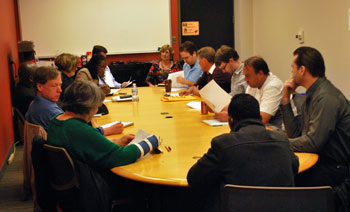Ann Arbor Taxi Board Reacts to Uber
Ann Arbor taxicab board meeting (April 23, 2014): In its one action taken at the meeting, the board approved making a request of the city attorney’s office to come up with a draft of an ordinance amendment – that would require all drivers for hire to be registered in the city.
The action comes in response to Uber‘s entry into the Ann Arbor market. Uber is a service, based on a mobile app, that coordinates prospective passengers with drivers who are willing to make the trip. Currently the city’s taxicab ordinance covers only taxicab drivers – not limousine drivers or any other drivers for hire. The board wants to see a draft ordinance that would include all drivers for hire – so that Uber’s drivers would need to be registered in the city of Ann Arbor.
Stephen Kunselman, who serves as the city council’s representative to the taxicab board, put it this way at the meeting: “The number one issue of regulating drivers in the industry is for public safety, alright? I want to know who these drivers are who are driving around picking up people in our town, okay? Number one issue.”
A change to the city’s ordinance could come only after approval by the city council.
The action requesting the city attorney’s office to begin work on an ordinance amendment was not actually on the board’s meeting agenda. The one item for discussion had been to consider possible deregulation of taxicab fares in the city – a topic the board has been considering for about a year. As board chair Michael Benson put it, “It’s time to address it one way or the other.” Currently the maximum rate is $3 to get in, $2.50 per mile, and $0.40 a minute waiting time.
Those rates were last adjusted upwards on May 16, 2011, in response to gas prices that had nudged past $4 per gallon. With one exception, representatives of taxicab companies at the April 23 meeting were not looking for the kind of $0.25 adjustments that have been made in the past. Instead, they’re looking for a high maximum – along the lines of $5 to get in and $5 per mile – so that a competitive market could develop under that cap.
Benson and Tom Crawford – the city’s CFO and an ex officio member of the board – steered the conversation toward identifying ways to measure success of any change in the city’s approach to regulating fares: “What is it that you want to achieve? Let’s get some clarity on that so that we can identify whether we have succeeded or not. That’s the real point,” said Crawford.
What came out of that board discussion was that the measurement of success should include the number of taxicabs being operated in the city. At the meeting, Ann Arbor police officer Jamie Adkins told board members that for the three years from 2008 to 2010 there were 177, 193, and 179 taxicabs operating in the city, respectively. But when Yellow Car converted all but one vehicle to limousine, that number dropped to 111 in 2011. In 2012 there were 132 taxicabs, she said, and the current figure is 124.
The board’s past effort to regulate the entire livery industry – including limousines, which are supposed to take only pre-arranged, not hailed rides – has included recommendations to revise the city’s ordinance so that limousine companies cannot hold themselves out as taxicab companies. And the city council enacted those changes in 2011. But according to officer Adkins, AAPD has learned that those aspects of the ordinance can’t be the primary reason for a police traffic stop. [.pdf of Ann Arbor taxicab ordinance] [Full Story]




